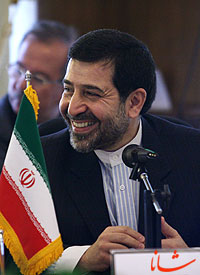Hojjatollah Ghanimifard told reporters that
Ghanimifard, who represents
"We hope to reach an agreement on the price in
"It is natural that the three nations would consider their own interests in the talks. However, they should reach a consensus based on international criteria," Ghanimifard
concluded.
Dubbed peace pipeline, Iran-Pakistan-India (IPI) gas line is a proposed 2,775 km pipeline project to deliver natural gas from
The Iranian petroleum minister’s special envoy for the peace pipeline talks assured that Iran-Pakistan-India (IPI) gas contract would be finalized by the end of June.
Hojjatollah Ghanimifard told PIN the views of
“At this stage, we are negotiating on the trilateral contract and gas will be exported to
“The deadline for finalization of the contract is June 30,” recalled the chief negotiator, expressing hope all problems would be settled by the date.
Talking about
“The initial demand of Pakistan and India for Iran’s gas amounted to 150 million cubic meters per day, but we announced that Iran had now the capacity to supply 60 million cubic meters of commodity daily and we could increase its volume in next phases,” said the official, concluding that it was natural that Pakistan was seeking a contract with Turkmenistan as Iran was not able at present to meet Pakistan’s need fully.
The special envoy said the last round of peace pipeline talks would be held in Pakistan, expressing hope the three states would reach an agreement on price in today’s and tomorrow’s negotiations.
During his last month visit to
“The talks now hinge on agreement over the tariff to be charged by
The minister said he did not expect there to be any major delays in signing a full sales and purchase agreement. “The commercial agreement is nearly complete -- we are working very sincerely,” he said.
The project is expected to greatly benefit both
Senior representatives from
The three sides have met several times but have failed so far to reach a consensus over a price for


Your Comment